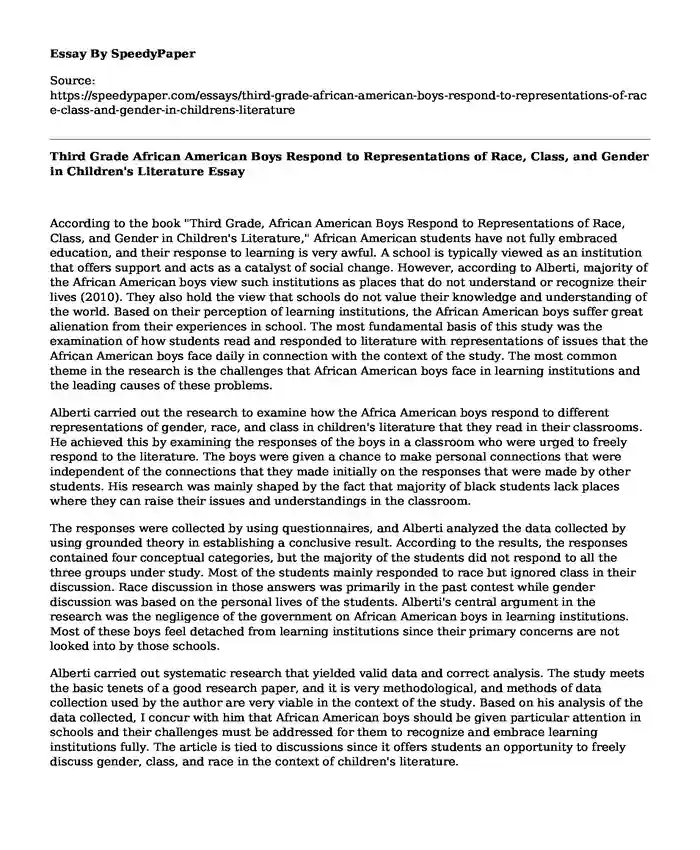According to the book "Third Grade, African American Boys Respond to Representations of Race, Class, and Gender in Children's Literature," African American students have not fully embraced education, and their response to learning is very awful. A school is typically viewed as an institution that offers support and acts as a catalyst of social change. However, according to Alberti, majority of the African American boys view such institutions as places that do not understand or recognize their lives (2010). They also hold the view that schools do not value their knowledge and understanding of the world. Based on their perception of learning institutions, the African American boys suffer great alienation from their experiences in school. The most fundamental basis of this study was the examination of how students read and responded to literature with representations of issues that the African American boys face daily in connection with the context of the study. The most common theme in the research is the challenges that African American boys face in learning institutions and the leading causes of these problems.
Alberti carried out the research to examine how the Africa American boys respond to different representations of gender, race, and class in children's literature that they read in their classrooms. He achieved this by examining the responses of the boys in a classroom who were urged to freely respond to the literature. The boys were given a chance to make personal connections that were independent of the connections that they made initially on the responses that were made by other students. His research was mainly shaped by the fact that majority of black students lack places where they can raise their issues and understandings in the classroom.
The responses were collected by using questionnaires, and Alberti analyzed the data collected by using grounded theory in establishing a conclusive result. According to the results, the responses contained four conceptual categories, but the majority of the students did not respond to all the three groups under study. Most of the students mainly responded to race but ignored class in their discussion. Race discussion in those answers was primarily in the past contest while gender discussion was based on the personal lives of the students. Alberti's central argument in the research was the negligence of the government on African American boys in learning institutions. Most of these boys feel detached from learning institutions since their primary concerns are not looked into by those schools.
Alberti carried out systematic research that yielded valid data and correct analysis. The study meets the basic tenets of a good research paper, and it is very methodological, and methods of data collection used by the author are very viable in the context of the study. Based on his analysis of the data collected, I concur with him that African American boys should be given particular attention in schools and their challenges must be addressed for them to recognize and embrace learning institutions fully. The article is tied to discussions since it offers students an opportunity to freely discuss gender, class, and race in the context of children's literature.
Reference
Alberti, J. M. (2010). Third grade African American boys respond to representations of race, class, and gender in children's literature. The University of Pennsylvania.
Cite this page
Third Grade African American Boys Respond to Representations of Race, Class, and Gender in Children's Literature. (2022, Mar 02). Retrieved from https://speedypaper.net/essays/third-grade-african-american-boys-respond-to-representations-of-race-class-and-gender-in-childrens-literature
Request Removal
If you are the original author of this essay and no longer wish to have it published on the SpeedyPaper website, please click below to request its removal:
- Insanity Defense Essay, Free Example for Everyone
- Kant and Mill in the Free Philosophy Essay Sample
- Free Essay Sample on If Not, Winter: Fragments of Sappho by Anne Carson
- Essay Example on the Relationship Between Memory and Identity in Wiesel's Night
- Rape as a Social Problem
- Paper Example. Urban Education and Related Trends
- Free Essay. Effect of Music Education on the Brain and Cognitive Abilities
Popular categories





